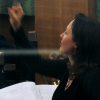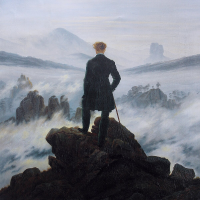Home » Jazz Musicians » Oliver Nelson
Oliver Nelson
Oliver Nelson needs to be reconsidered by music listeners for what he was - one of the most significant jazz voices of his generation, and an important big band composer and arranger of the 1960s. Perhaps the skill he mastered most keenly was his ability to turn listeners on. As difficult as his music might have been to play, and as hard as it is to analyze, it is extremely easy to listen to.
Born June 4, 1932 in St. Louis, Oliver Nelson came from a musical family: His brother played saxophone with Cootie Williams in the Forties, and his sister was a singer-pianist. Nelson himself began piano studies at age six and saxophone at eleven. In the late ‘40’s he played in various territory bands and then spent 1950-51 with Louis Jordan’s big band. After two years in a Marine Corps ensemble, he returned to St. Louis to study composition and theory at both Washington and Lincoln universities.
After graduation in 1958, Nelson moved to New York and played with Erskine Hawkins, Wild Bill Davis, and Louie Bellson. He also became the house arranger for the Apollo Theatre in Harlem. Though he began recording as a leader in 1959, Nelson’s breakthrough came in 1961 with “The Blues and the Abstract Truth,” (Impulse) featuring an all- star septet of; Eric Dolphy, Bill Evans, Roy Haynes, Paul Chambers and Freddie Hubbard. With the success of that deservedly acclaimed album, Nelson’s career as a composer blossomed, and he was subsequently the leader on a number of memorable big-band recordings, including “Afro-American” (Prestige) and “Full Nelson” (Verve). He also became an in-demand studio arranger, collaborating with Cannonball Adderley, Johnny Hodges, Stanley Turrentine, and others. In addition to dates he led under his own name, he wrote, scored and conducted under the names Leonard Feather's Encyclopedia of Jazz All Stars and the Jazz Impressions Orchestra; did a date for Shirley Scott and another for Ray Brown and Milt Jackson; five sessions with organist Jimmy Smith, including the legendary “Walk on the Wild Side," another headlined by Smith and Wes Montgomery; and the incomparable Pee Wee Russell. During the Sixties, Nelson became one of the most strongly identifiable writing voices in jazz. Since Nelson was schooled in both the American jazz and European music traditions, his arrangements can be intricate, but when it comes time for a solo, it's clear that Nelson (who was himself a brilliant soloist on tenor alto and soprano saxophone) has fashioned everything as the proper set up for the featured player.
Read moreTags
Verve's Bossa Nova U.S.A.

by Arnaldo DeSouteiro
Paul Desmond: Samba with Some Barbecue Originally titled “Struttin' with Some Barbecue" in 1941, this Satchmo tune lost its Dixie beat and got a bossa groove in the hands of the infallible Don Sebesky. Brazilian drummer Airto Moreira, then a newcomer in the New York jazz scene, provides a fiery propulsion to Paul Desmond's lyrical approach and “dry martini" alto sound. Different from the sad results of pseudo-bossa albums by Gene Ammons, Sonny Rollins, and so many others, this is ...
Continue ReadingSixteen Horns v. Six Strings

by Patrick Burnette
Big bands tempt the ambitious jazzer with their expansive possibilities for arrangements, the variegated colors they offer, and their sheer power. But, boy, those budgets! These days you need a generous label or a grant or two to make things work. We take a look at a very seventies example of the genre and then a brand new effort by a young woman barely old enough to drive. A guitar trio and a guitar solo fill out the episode, and ...
Continue ReadingVarious Artists: First Impulse: The Creed Taylor Collection 50th Anniversary

by Chris May
The headline news on this lavishly packaged, four-CD collection of the work of the Impulse! label's founding producer, Creed Taylor, is that it includes three previously unreleased tracks by John Coltrane. These were recorded during rehearsals for what would become the saxophonist's Impulse! debut, Africa/Brass, in 1961. They have a combined playing time of less than eight minutes, but as newly discovered Coltrane recordings are reduced to a trickle with the passage of time, the arrival of any such material, ...
Continue ReadingOliver Nelson: Oliver Nelson: The Argo, Verve and Impulse Big Band Studio Sessions

by Andrew Velez
The work of Oliver Nelson (1932-1975), saxophonist, composer and arranger (including composing orchestral and chamber music in non-jazz idioms), is remembered in this typically classy Mosaic six-CD set of 1962-1967 sessions. In his liner notes Nelson scholar and saxophonist and composer/arranger Kenny Berger observes, “The recordings in this set were made from the mid to late period of the last golden age of the studio recording in New York. Nelson's experience as a jazz soloist himself made ...
Continue ReadingOliver Nelson With Eric Dolphy: Screamin' the Blues

by Samuel Chell
Screamin' the Blues is an apt description of the soloists' approach on this 1960 session, here reissued as an RVG remaster, the first of three matching leader Oliver Nelson with avant-gardist Eric Dolphy. Although not as well-known as Nelson's masterpiece, Blues and the Abstract Truth (1961), the date is characterized, above all, by “generosity" on the part of all three principals, including the underrated trumpeter Richard Williams.
Nelson's tenor solo on the title tune is the equivalent of an operatic ...
Continue ReadingOliver Nelson: Screamin' The Blues

by Chris May
A gutsy, down-home, blues-drenched saxophonist who could make flames burst out of the bell of his horn, Oliver Nelson is probably best remembered for his back-room chores on other musicians' records. He arranged Jimmy Smith's biggest chart hit, “Walk On The Wild Side," and an even bigger one for Louis Armstrong, “What A Wonderful World." He also arranged some enduring film scores, notably Sonny Rollins' music for Alfie, Gato Barbieri's music for Last Tango In Paris, and Diana Ross' Billie ...
Continue ReadingOliver Nelson: Screamin' The Blues

by Ronald S. Russ
There were many saxophonists on the scene in 1960 who would influence jazz for the next forty years. While saxophonist/composer/arranger Oliver Nelson might not be the best known of the musicians of that era, he blew alongside some of the greats. He is probably best known for his compositions and arrangements ("Stolen Moments," “Miss Fine" and “Hobo Flats" come to mind). Nelson was born in St. Louis, Missouri and played with big bands like the Jeter-Pillars Orchestra in the late ...
Continue ReadingBackgrounder: Oliver Nelson - Taking Care of Business

Source:
JazzWax by Marc Myers
Last week, following my series on organ combos, Bill Kirchner sent along a terrific Backgrounder suggestion: Oliver Nelson's Taking Care of Business, Nelson's second leadership date. Recorded in March 1960, the album featured Oliver Nelson (as,ts), Lem Winchester (vib), Johnny “Hammond" Smith (org), George Tucker (b) and Roy Haynes (d). The tracks: Trane Whistle (Oliver Nelson) Doxy (Sonny Rollins) In Time (Nelson) Lou's Good Dues Blues (Nelson) All the Way (Sammy Cahn, Jimmy Van Heusen) Groove (Nelson) Talk about a ...
read more
The Sound of Feeling, 1968

Source:
JazzWax by Marc Myers
In November 1968, Verve Records released what today may seem like an unusual album but back then was perfectly in sync with the youth-focused times. The LP was called Leonard Feather Presents... The Sound of Feeling and the Sound of Oliver Nelson. Recorded in 1966 (the Nelson big band tracks) and 1967 (the vocal tracks), and produced initially by Creed Taylor and then Jesse Kaye after Creed left for A&M to start CTI, The Sound of Feeling featured a Los ...
read more
Oliver Nelson + Eric Dolphy

Source:
JazzWax by Marc Myers
The blues were in Oliver Nelson's blood. Virtually everything he wrote and arranged had an indigo hue. But Nelson's original works weren't your average blues. They were blues cathedrals constructed with flying-buttress passages, gargoyle phrases and stained-glass voicings. When Nelson played the alto or tenor saxophone on these blues, there was a warm clarity to his tone and a sweetness to how he dragged notes. Nelson recorded head-to-head albums with Eric Dolphy, a blues master of another stripe. Dolphy's blues ...
read more
Electrifying Track: Miss Fine

Source:
JazzWax by Marc Myers
Let's stick with Oliver Nelson today. In addition to being a high-impact modernist jazz arranger, Nelson was a sensational composer. Miss Fine is from Full Nelson, Nelson's second album as the leader of a big band. The album was recorded for Verve in 1962 and '63, and produced by Creed Taylor. The song, which has a Shiny Stockings feel, was named after and dedicated to Nelson's younger sister, Leontine LaCoste, who in 1963, when this album was released, was playing ...
read more
Steven Allen and Oliver Nelson

Source:
JazzWax by Marc Myers
Let's downshift slightly today during this week of little-known jazz albums with big-name arrangers conducting supersized orchestras. On Monday, I told you about Jimmy Smith's Portuguese Eyes (with Thad Jones) and yesterday I showcased Billy Taylor's Right Here, Right Now! (with Oliver Nelson). Today, let's look at two albums that Oliver Nelson recorded with TV host, composer and pianist Steve Allen. Admittedly, these albums are breezier by comparison and lean into the pop realm. But they were still arranged by ...
read more
Herbie Mann with Oliver Nelson

Source:
JazzWax by Marc Myers
Herbie Mann was a fascinating jazz figure. The flutist and saxophonist was a dominant player in the 1950s, recording prolifically as a leader and sideman, and always bringing tremendous swing and lyricism to his work. Both of Mann's parents were dancers, so his keen sense of time makes perfect sense. Tall and lean, he became the prototype for beat-generation beboppers, coffee-house bongo players, the folk-jazz hipsters and Greenwich Village VW-driving daddy-o's. Mann also had a eye and ear for the ...
read more
Oliver Nelson and Leo Gooden

Source:
JazzWax by Marc Myers
After-hours jazz clubs had a certain magic and nocturnal charm in the 1950s and '60s. They existed because in many cities, mainstream jazz clubs were regulated and had to issue a last call around midnight. Musicians and audiences in the know would then head off to clubs with bottles stashed out of sight and plenty of great talent on stage. Many of these clubs operated in neighborhoods that the police left alone. So in St. Louis, Mo., when the clubs ...
read more
Oliver Nelson: Fantabulous

Source:
JazzWax by Marc Myers
Oliver Nelson occupies an interesting space among jazz composers and arrangers in the 1960s. While not as well known as Quincy Jones, Lalo Schifrin or Claus Ogerman, Nelson is a favorite among those familiar with his music. Unlike many of his peers, Nelson specialized in explosive, blues-centric jazz compositions and charts that could wail and moan with the muscular drama of a film noir score. What's more, Nelson played tenor saxophone on many of his own sessions, giving the orchestra a ...
read more
STLJN Audio Archive: Oliver Nelson - Black, Brown and Beautiful

Source:
St. Louis Jazz Notes by Dean Minderman
This week's StLJN Audio Archive post comes once again via the Flying Dutchman blog, which has preserved most of the output of that once vibrant, now defunct jazz imprint of the 1960s and 1970s. Saxophonist, arranger/composer and St. Louis native Oliver Nelson made a number of albums for Flying Dutchman, and today we feature Black, Brown and Beautiful, an ambitious effort composed and arranged entirely by Nelson and recorded in October, 1969 in Los Angeles. Here's what the website Dustygroove ...
read more
Oliver Nelson Revisited

Source:
Rifftides by Doug Ramsey
In his few years, Oliver Nelson achieved major success as a composer and arranger in jazz and in the Hollywood studios. His first big band collection, Afro-American Sketches (1961), made it clear that he was an important new talent. His Blues And The Abstract Truth with an all-star septet that included Bill Evans, Freddie Hubbard and Eric Dolphy is one of the most significant jazz albums of the second half of the 20th century. A good saxophonist, Nelson blossomed as ...
read more










































